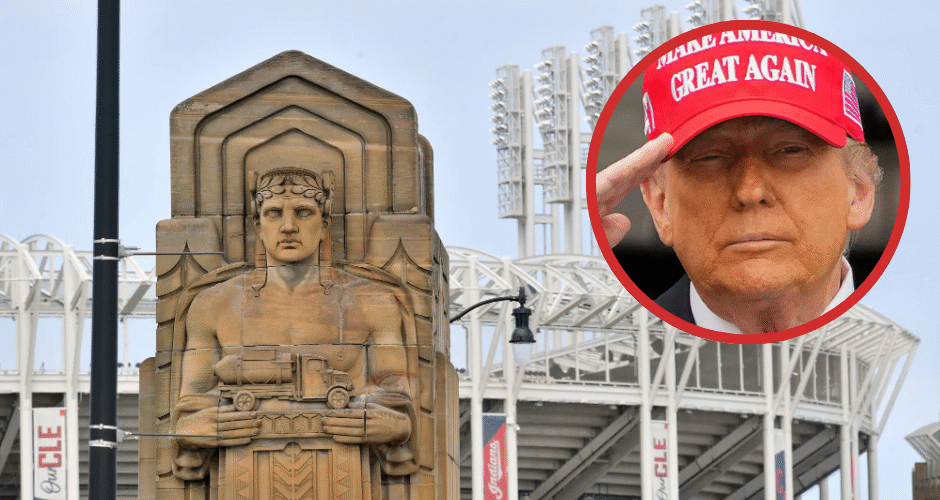Trump Wants ‘Indians’ Back—But Who’s He Really Fighting For?
It wasn’t inflation. It wasn’t Ukraine. It wasn’t even Joe Biden dozing off during a NATO summit. No—Donald J. Trump opened up his weekend by launching a cultural cruise missile… at two sports teams.
Yes, in the year 2025, with the nation wrestling with real and urgent challenges, Trump trained his fire on the Cleveland Guardians and the Washington Commanders, demanding they return to their pre-2020s names: the Indians and the Redskins.
You’d be forgiven for thinking this was satire. But nope—this is just another entry in Trump’s ever-expanding playbook of cultural grievance, where the actual impact matters less than the outrage it provokes. His goal? To rally emotions, inflame Facebook feeds, and remind everyone that no matter how absurd the cause, he’s always got a culture war to wage.
“Our Great Indian People Want This.”
That’s what Trump claimed in his now-viral post, insisting Native Americans were apparently begging him to restore the very names that tribal leaders, activists, and community organizations spent decades protesting.
His exact words? “Our great Indian people, in massive numbers, want this to happen. Their heritage and prestige is systematically being taken away from them.”
It’s not the first time Trump has tried to speak on behalf of people he rarely listens to. But the irony here is staggering: the pressure to drop those team names originated with Native voices who found them stereotypical, outdated, and—yes—racist.
So who is Trump actually standing up for? Spoiler: it’s not the “great Indian people.” It’s a certain slice of his base who long for a time when “political correctness” hadn’t reached their jerseys.
Sports as a Political Battlefield
Trump’s war on sports culture isn’t new. He’s called kneeling Black athletes “sons of bitches,” railed against trans athletes, and accused the U.S. women’s soccer team of being too “woke” to win.
Now, he’s aiming his megaphone at teams that made decisions years ago—decisions supported by their own cities, fans, and leagues. Cleveland’s Guardians name has already been adopted, their stadium signage updated, and most fans have moved on. Washington’s journey was more complicated, but their move away from “Redskins” was applauded by Native groups and long-overdue critics.
Yet here comes Trump, treating it like a fresh wound. Why? Because for him, the culture war is an infinite game. The point isn’t to win—it’s to keep playing.
Stadiums, Symbols, and Smoke Screens
Let’s be honest: Trump knows he can’t force a name change. The Cleveland Guardians shrugged off his demand with a barely audible eye-roll. And while the Washington Commanders have more on the line—with potential stadium deals in the works—there’s little legal or political mechanism for Trump to coerce them.
Sure, he hinted that unless the Commanders change their name, he might block their return to DC. But that threat has more hot air than a Fourth of July parade. President Biden already signed over the land where RFK Stadium once stood to the DC city government, reducing the federal government’s sway in the matter.
Could Trump still pressure local politicians? Maybe. Could he squeeze DC’s budget as punishment? Conceivably, though that would spark a federalism battle. But most likely? This entire saga will fade—until the next time Trump needs a diversion.
The Real Battlefield? Your Brain
This isn’t really about football or baseball. It’s not about mascots or nostalgia. This is about outrage—raw, potent, and weaponizable. Trump doesn’t need to win this fight. He just needs you to pick a side.
And in doing so, he injects himself into headlines, hijacks news cycles, and re-energizes the grievance machine that fuels his political momentum.
Remember: every minute we’re debating whether raccoons still live in RFK Stadium ruins is a minute we’re not talking about court cases, foreign policy, or campaign finance.
So… Will the Names Change Back?
Short answer: no.
Cleveland is not going back to “Indians.” Washington is not going back to “Redskins.” Not because Trump doesn’t want it, but because history has moved on—and fans have too.
And while some may feel nostalgic for those names, nostalgia alone doesn’t override decades of activism, progress, or plain ol’ business sense. The teams have rebranded, sold new merchandise, and cultivated new identities. Turning back now would be a PR disaster of epic proportions.
But then again, “epic disaster” is Trump’s favorite playground.
